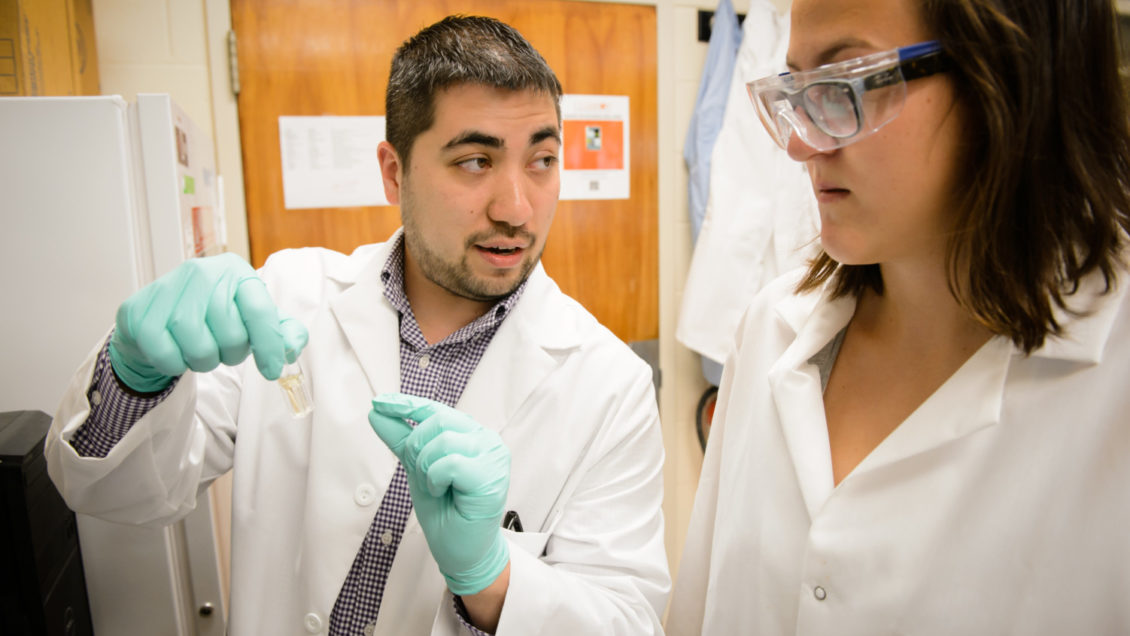CLEMSON — A Clemson University associate professor whose research could help enable long-term space missions and search for some of the globe’s most destructive weapons is receiving the U.S. government’s highest honor for early-career scientists and engineers.
Mark Blenner, the McQueen-Quattlebaum Associate Professor in the department of chemical and biomolecular engineering, is receiving the Presidential Early Career Award for Scientists and Engineers, also called PECASE.

“It’s an honor to be included among such an esteemed group of scientists and engineers from across the country,” Blenner said. “I’d like to thank all who made it possible, including the undergraduate and graduate students who work in my lab, as well as all of my mentors and my colleagues at Clemson University.”
Blenner was among 311 researchers nationwide, including two from South Carolina, honored with the award, according to the White House.
“The PECASE is the highest honor bestowed by the United States government to outstanding scientists and engineers who are beginning their independent research careers and who show exceptional promise for leadership in science and technology,” it stated.
Blenner is the fifth Clemson University researcher to win the award since it was commissioned in 1996 by the cabinet-level National Science and Technology Council. He is the second winner from Clemson’s chemical and biomolecular engineering department.
Blenner works with bacteria and yeast to make new enzymes that are able to do things nature has not yet figured out. The research gives the students in his lab a chance to work on the cutting edge of synthetic biology.
In one project, Blenner and his team are working to engineer yeast to convert respiration carbon dioxide, algae biomass and urine into 3D printable plastics and nutritional omega-3 fats. Astronauts on missions to Mars could, for example, use the plastics to make new tools and use the omega-3 fatty acids for maintaining health.
Some of Blenner’s other research has focused on developing sensors.
One would pick up signatures of tributyl phosphate, a solvent used to enrich uranium, including for use in nuclear weapons. Another sensor he is helping develop could determine if radiation is natural or manmade and peaceful or weapons grade.
Further, Blenner is leading a program aimed at increasing diversity in engineering. He and his team are recruiting students who are from groups underrepresented in engineering and helping them work toward doctoral degrees in chemical engineering so they can then pursue careers in education and research.
The idea behind the program is to create a new generation of professors to serve as role models for underrepresented groups.
Blenner received his Ph.D. and Master of Science in chemical engineering, both from Columbia University. He received his Bachelor of Science in chemical engineering from Manhattan College.
Blenner served as a research fellow at Children’s Hospital Boston and Harvard Medical School before joining Clemson as an assistant professor in 2012.
The White House announcement marked the first time that a new group of PECASE awardees has been announced since January 2017 when 102 scientists and researchers were honored. In February 2016, 105 researchers received the award.
David Bruce, chair of chemical and biomolecular engineering, congratulated Blenner on the honor.
“The PECASE is a highly competitive national award,” he said. “I am excited that his exceptional work has received the attention it richly deserves and greatly appreciate how his efforts are strengthening Clemson’s reputation in the broader scientific community.”
The nominating agency for Blenner’s award was NASA, and he was one of 18 from the administration to win.
“These PECASE winners represent some of the brightest early career researchers that NASA supports,” said James Green, NASA chief scientist. “They were selected for what they have already accomplished, but more importantly, we expect they will reach even higher goals in the future. They are shining stars.”
In an extended statement, Blenner said, “I thank my graduate and undergraduate students who have made huge contributions to pushing the science forward. Also, thanks to my mentors going all the way to high school, and the NASA group in the Space Technology Mission Directorate and at the Ames Research Center who have supported my work since 2015.
“Also, my accomplishments would not have been possible without my close colleagues at Clemson, particularly in the Department of Chemical and Biomolecular Engineering, whose support and excellence have driven me to push my boundaries further.
“Finally, I should acknowledge the funding that has supported my groups’ research since 2014, including the National Science Foundation, Air Force Office of Scientific Research, NASA, Defense Threat Reduction Agency, Animal Co-Products Research and Education Center, National Institutes of Health, U.S. Department of Education, U.S. Department of Energy, Creative Inquiry, Calhoun Honors College, and Advanced Mammalian Biomanufacturing Innovation Center.”
Anand Gramopadhye, dean of the College of Engineering, Computing and Applied Sciences, said the award underscores that Blenner is working at the frontiers of engineering.
“This is truly fantastic news — a testament to Dr. Blenner and his research team,” he said. “I congratulate them on this richly deserved honor.”
To view the White House news release, click here.
Get in touch and we will connect you with the author or another expert.
Or email us at news@clemson.edu

